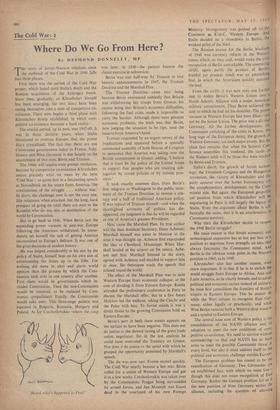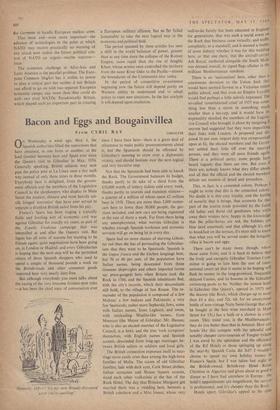The Cold War : 2
Where Do We Go From Here?
By DESMOND DONNELLY, MP Ttut story of Soviet-Western relations since the outbreak of the Cold War in 1946 falls into three phases.
First there was the period of the Cold War proper, which lasted until Stalin's death and the Russian acquisition of the hydrogen bomb. Since then, gradually, as Khrushchev himself has been emerging, the two blocs have been easing themselves into a state of competitive co- existence. There now begins a third phase with Khrushchev firmly established, in which com- petitive co-existence becomes a hard reality.
The crucial period, up to now, was 1947-49. It was in those decisive years, when Stalin threatened to overrun Europe, that the power blocs crystallised. The fact that there are not Communist governments today in France, Italy, Greece and West Germany is due largely to the staunchness of two men, Bevin and Truman.
The 1960s will require even greater resolution, because by competitive co-existence Khrushchev means precisely what we mean by the term 'Cold War': to quote him in a fascinating speech at Novosibirsk on his return from America, 'the continuation of the struggle . . . without war.' In short, the challenge now is not the easy one, like resistance when attacked, but the long, hard prospect of going on until there are men in the Kremlin who do not aim at domination of the world by Communism.
But to go back to 1946. When Bevin saw the expanding power vacuum in post-war Europe following the American withdrawal, he imme- diately set himself the task of getting America recommitted to Europe's defence. It was one of the great decisions of modern history.
He was helped considerably in his aim by the policy of Stalin, himself bent on his own aim of communising the States up to the Elbe. For nothing did more to alert and alarm world opinion than the process by which the Com- munists took over in one country after another. First there would be governments which in- cluded Communists. Then the non-Communists would be removed, to be replaced by Com- munist sympathisers. Finally, the Communists would take over. This three-stage pattern was repeated in Bulgaria, Rumania, Hungary and Poland. As for Czechoslovakia—where the coup
'Heard what's happened to Fred?'
was later, in 1948—the pattern became the classic exercise in subversion.
Bevin was met half-way by Truman in two historic announcements in 1947, the Truman Doctrine and the Marshall Plan.
The Truman Doctrine came into being because Bevin announced suddenly that Britain was withdrawing her troops from Greece; his excuse being that Britain's economic difficulties, following the fuel crisis, made it impossible to carry the burden. Although there were genuine economic problems, the truth was that Bevin, now judging the situation to be ripe, used the issue to force America's hand.
Truman responded by an urgent survey of the implications and appeared before a specially summoned assembly of both Houses of Congress to announce that America was taking over the British commitment in Greece, adding, 'I believe that it must be the policy of the United States to support free peoples who are resisting sub- jugation by armed policies or by outside pres- sures.'
It took exactly nineteen days, from Bevin's first telegram to Washington to the public state- ment of the Truman Doctrine, to reverse a cen- tury- and a half of traditional American policy. It was typical of Truman himself—and when the shortsighted acrimony of politics has dis- appeared, my judgment is that he will be regarded as one of America's greatest Presidents.
Next came the Marshall Plan. Its true author was the then Assistant Secretary, Dean Acheson; Marshall himself was away in Moscow at the time it was thought up. Acheson first expounded the idea at Cleveland, Mississippi. When Mar- shall landed at the airport on his return, Ache- son met him. Marshall listened to the story, agreed with Acheson and decided to support him at once. He thereupon made the speech that echoed round the world.
The effect of the Marshall Plan was to save Western Europe from economic collapse, at the cost of dividing it from Eastern Europe. Russia attended the preliminary conference in Paris to discuss the Marshall offer; but in a few hours Molotov led the walkout, taking the Czechs and the Poles with him. To Soviet minds it was a direct threat to the growing Communist hold on Eastern Europe.
Bevin's part in both these events appears on the surface to have been negative. This does not do justice to the shrewd timing of the great trade union negotiator, for in the last analysis he could have overruled the Treasury on Greece. Nor does it do justice to the speed with which he grasped the opportunity presented by Marshall's speech.
The die was now cast. Events moved quickly. The Cold War nearly became a hot _war. Sevin called for a union of Western Europe and got it in a few weeks. Czechoslovakia was taken over by the Communists, Prague being surrounded by armed forces, and Jan Masaryk was found dead in the courtyard of his own Foreign Ministry. Montgomery was packed off to the Continent as C-in-C, Western Europe. And Stalin decided on a showdown in Berlin, the weakest point of the West.
The Russian excuse for the Berlin blockade of 1948 was currency reform in the Western zones, which, so they said, would make the joint occupation of Berlin unworkable. The countering airlift', again partly the product of Bevin's fruitful yet prudent mind, was an astonishing feat, in which the Americans quickly assumed the lead.
From the airlift, it was now only one further step to widen Bevin's Western Union into 3 North Atlantic Alliance with a major American military commitment. Thus Bevin achieved the task to which he had set his shoulder. The power vacuum in Western Europe had been filled—and not by the Soviet Union. The price was a divided Germany. All the further developments, the Communist switching of the crisis to Korea, the long saga of the European Army, the growth of Western Germany, are each major events. But the plain fact remains that when the Summit Con- ference assembles this weekend, the cards Lin the Western table will be those that were stacked by Bevin and Truman.
Stalin's death, the growth of Soviet techno- logy, the Twentieth Congress and the Hungarian revolution, the victory of Khrushchev and the party appurat over the Soviet bureaucracy are the complementary developments on the Cool' munist side. But again, the European geopoliti- cal position from which Khrushchev will be negotiating in Paris is still largely the legacy of Stalin. Even the argument about Berlin is still basically the same, that it is an anachronism in Communist territory.
Why then did Khrushchev decide to reopen the 1948 Berlin struggle?
His main ,reason is that Soviet economic and technological expansion has at last put him in 3 position to negotiate from strength, an idea that always fascinates the Communist mind. And Berlin is the obvious weak point in the Western position in 1960, as in 1948.
Khrushchev also has another reason, even more important. It is. that if he is to switch the world struggle from Europe to Africa, Asia and Latin America, as he clearly intends, and to adopt political and economic tactics instead of military, he must first consolidate the frontiers of Stalin's empire in Eastern Europe. This he cannot do while the West refuses to recognise East Ger- many, either legally or practically; and while West Berlin remains both a Western shop window and a symbol to Eastern Europe.
The central issue now of Western policy is the consolidation of the NATO alliance and its adaption to meet the new conditions of corn' petitive co-existence. We need to survive without surrendering—to that end NATO has to hale arms to meet the possible Communist threat at every level, but also it must address itself to the political and economic challenge outside EuroPe.
The European problem has ceased to be the reunification of Germany. Two Germanies are an established fact, with which we must live-- though this does not mean recognition of East Germany. Rather the German problem for us is the new position of West Germany within the alliance, including the question of allowinS the Germans to handle European nuclear arms.
That issue and—even more important—the advance of technologies to the point at which NATO may receive practically no warning of any attack now makes the future political con- trol of NATO an urgent—maybe supreme— issue.
The economic challenge in Afro-Asia and Latin America is the parallel problem. The Euro- pean Common l‘farket has it within its power to play a critical part but neither it nor Britain can afford to go on with two separate European economic camps, any more than they could do with two rival NATOs. Paradoxically Britain, which played such an important part in creating a European military alliance, has so far failed lamentably to take the next logical step in the economic and political field.
The period spanned by these articles has seen a shift in the world balances of power, greater than at any time since the collapse of the Roman Empire, more rapid than the rise of Jenghiz Khan, whose armies once controlled the territory from the same River Oder to the Pacific—almost the boundaries of the Communist bloc today.
In the period of competitive co-existence beginning now the future will depend partly on Western ability to understand and to adapt policy to meet new situations. In the last analysis it will depend upon resolution.





































 Previous page
Previous page